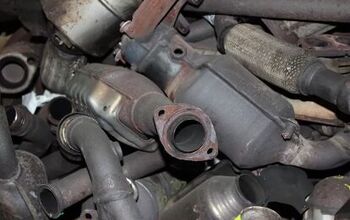GM Secured Lenders Await Full Recovery on $6 Billion in Debt
In sharp contrast to the nasty cramdown of Chrysler bondholders, GM’s secured lenders will receive full recovery on some $6 billion in debt, courtesy of your United States Treasury. According to the WSJ, Treasury will “inject a fresh $50 billion in various financings to back a GM workout,” which would result in a 70 percent equity stake in the “new GM.” Although the plan had been for GM to exit bankruptcy still carrying some $40 billion of its approximately $80 billion in debt, the bank payoff should help trim GM’s debt to a mere $10-$12 billion. To accomplish this, the Treasury will pay Citi, JP Morgan and other financiers of GM’s $4.5 billion revolving line of credit that comes due in 2011 and a $1.5 billion term loan due in 2013. In full. Which beats 29 cents on the dollar any day.
More by Edward Niedermeyer


































Comments
Join the conversation
A co-worker had just inherited some GM bonds that his mother had for years. He said under the previous proposal he would have ended up with about 2 shares of new GM. Now maybe he'll get some real cash out of it. Sweet!
Eric: You miss the point. While GM isn't going to sell assets as long as Uncle Sam comes along with some extra cash, the fact remains that had the government not stepped in, GM most likely could have raised enough cash in a liquidation to cover their secured creditors 100 cents on the dollar. The name of the game when it comes to not upsetting the rules of debt priority is not letting the secureds end up any worse than they would have without an intervention. Which is what this is all about. In the case of GM, where you have a small slice of secured creditors and a large number of unsecureds, that means making the secureds whole. In the case of Chrysler, where most of the debt was secured and the liquidation value of the company was probably not much in relation to the amount outstanding, it means something a lot different. Had the government not taken this step, then I would jump on the bandwagon which formed after the Chrysler bankruptcy filing, which accused the government of ignoring the traditional rules of debt priority and expropriating the secured bondholders in all sorts of horrible ways. But in this case the government is actually going out of its way to do what is right. Which is something I haven't been hearing the critics own up to during this round. WildBill: Don't get your hopes up. While most Chrysler bondholders were actually secured creditors, I am almost certain that most GM bonds, especially those sold to the general public, are unsecured debts. It is the secured class of creditors, not the unsecured class, which is to receive the benefit of the refinancing discussed in the article. I have very little expectation that the unsecured bondholders will see anything over the coming months. So your friend is still screwed. Probably even worse than before.
I thought this was a response to the bond markets threatening after Chrysler's secured lenders being ignored to never again buy bonds from union companies if GM didn't pay out their lenders. My 20 cents (hey 2 cents ain't what it used to be).
law stud: Your argument would make sense if (a) the "bond markets" could actually speak with a single voice and (b) GM was actually planning on paying off some bonds. This article was about GM paying off certain secured bank loans (a small number of obligations between a company and a single, or small number of, financial institutions), not about GM paying off bonds (a large number of identical, serial obligations between a company a large and varied pool of note holders). More broadly, the idea that banks or bond investors would flee unionized companies en masse in the wake of the Chrysler bankruptcy is simply bogus. Have banks fled Boeing? Have investors shunned municipal bonds? Have all the airlines been grounded after their working capital was yanked? Has television gone off the air? The phone company lost its dial tone? "No," to all of these examples. What else do they have in common? They are all highly unionized companies or sectors. And the banks and financial markets still transact business with them on normal terms. This isn't a clumsy sop at market participants who were actually and legitimately worried about the rule of law in the wake of the Chrysler bankruptcy. Because nobody in the world of finance really had serious worries on that score prompted by Chrysler (they have other complaints and worries, to be sure, and a few -- a surprisingly small number, at that -- have tried to dress up their other worries as complaints about the rule of law, but the ruse is usually obvious). This is simply an action that conforms with, and is demanded by, those very rules of law which we are all worried about. It's the system working, not a panic move.